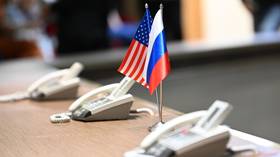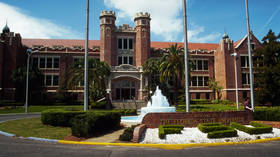NSA spying on Visa and SWIFT 'smells like economic espionage'
Reports of penetration of Visa and SWIFT by the NSA means it can get details of activities of foreign banks and pass it on to US competitors, giving them advantages on financial markets, US attorney Gerald Horne told RT.
RT:Der Spiegel reports have been dismissed by Visa after the company said it was impossible. Do you think the agency accessed clients' private information?
Gerald Horne: I think it's highly possible. These latest
revelations from Edward Snowden gives an idea why US authorities
were so keen to detain, arrest, perhaps, indict him. First of all
there is the question of privacy. That is to say that the NSA is
well-known for not-vetting investigating the contractors that
they hire. They can get access to the personal data of various
individuals and that can lead to identity theft, that can lead to
various kinds of fraud.
But the other aspect of the Spiegel story I think is more
fascinating. You may recall that Der Spiegel also reported that
SWIFT with is this interbank entity based in Brussels, Belgium,
also was penetrated by NSA.
That smells like espionage on the economic level. That is to say that the NSA can get details of what a German bank may be doing, a Russian bank may be doing, what a Chinese bank may be doing and pass that on to their US competitors, thereby giving the US competitor an advantage at a financial market.
RT:How will this affect those who use credit cards and regular banking services on a daily basis?
GH: I would recommend that anyone using a credit card - and this is no revelation - should be very careful where you are passing that card, where you are using that card. Because if [the] NSA is able to penetrate Visa, that raises the question of whether other agencies and entities are able to penetrate Visa, and that opens up a Pandora’s box that can lead to all manner of fraud.

RT:Using credit cards can be a dangerous game, but then it seems cash can be a dangerous game as well. Reports claim the FBI warned gun shops to be on their guard for people paying with cash only. Does that mean that people who are using cash are now also a target of investigation just because they don't pay with plastic?
GH: Well, it's well-known in the US that if you make a deposit at a bank of $10,000 or more in cash that opens you up to investigation and vetting. So yes, I do think that there is a certain downside to using large amounts of cash. And it's well known if you step back and look at the big picture that the US Treasury Department, supposedly in pursuit of what they refer to as terrorism, has been investigating all manner of financial transactions. From their point of view, they say, that they are trying to keep track of terrorist transactions. But as these recent revelations in Der Spiegel tend to suggest there are other possibilities that cannot be ignored as well.
RT:What about the privacy side of things, are we going to see people starting to keep their money under the proverbial mattress, away from the banks so that they can have some privacy?
GH: First of all, it's no accident that this story was
initially reported in a German publication. Germany, for
historical reasons that need not detain us here, has a particular
sensitivity to matters of privacy. Given the fact that the German
elections are taking place within days, it would not surprise me
at all if this becomes an issue in the German elections. We know
that Chancellor Merkel has raised recent revelations about NSA
spying on Germans with President Obama, and it would not surprise
me at all if she does the same thing with this recent Der Spiegel
revelation about Visa and SWIFT.
The statements, views and opinions expressed in this column are solely those of the author and do not necessarily represent those of RT.













